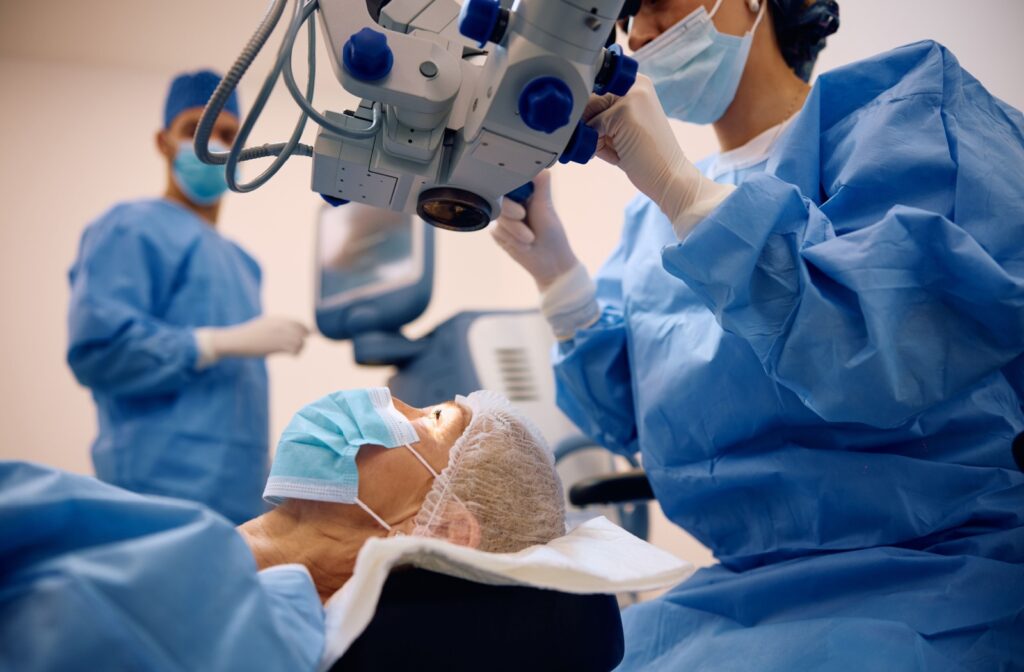Cataract surgery is a common corrective procedure that can significantly improve your vision. The procedure itself is relatively quick, and it can take up to 3 days for your eyes and vision to comfortably heal.
During this recovery period, it’s important to take a rest from a number of daily activities, including driving.
Driving isn’t recommended immediately after cataract surgery. As a general rule of thumb, avoid driving for a good 24 hours after surgery, or until your ophthalmologist gives you the green light to get behind the wheel.
Understanding Cataracts
Normally, the lens of our eye is meant to be clear. However, as we grow older, a cloudy growth may begin to develop over the eye’s natural lens. This is referred to as a cataract.
The cloudy lens develops when proteins in the eye’s lens clump together. This can lead to blurry vision and decreased visual clarity, which can significantly impact daily activities if left untreated.
Cataracts develop gradually and can affect one or both eyes. The rate at which the eye’s lens begins to cloud may differ between the right and left eyes, with one eye having significantly greater cataract progression. This isn’t a painful process; most likely, you won’t even feel it developing.
Progression of cataracts is a consequence of growing older and a natural part of the aging process. While you can’t completely prevent cataracts, certain lifestyle choices can reduce your risk:
- Wearing sunglasses to protect your eyes from UV rays
- Eating a diet rich in antioxidants
- Not smoking
Symptoms that suggest a cataract may be developing include:
- Blurry vision
- Difficulty seeing at night
- Light sensitivity
- Seeing halos
Surgically removing the cloudiness is the only effective treatment for cataracts. Non-surgical options like glasses or contact lenses can temporarily improve vision, but won’t stop cataracts from progressing. Cataract surgery involves replacing the cloudy lens with a clear artificial one to restore vision.
Leaving your cataracts untreated can eventually lead to severe vision impairment. Untreated cataracts can also increase your risk of falls and accidents due to poor vision. Therefore, timely surgical intervention is crucial for maintaining your quality of life.
Driving After Your Surgery
Immediately following your cataract surgery, it’s not safe to drive. As a general rule, the minimum time before you can drive is 24 hours. But, this depends on several factors.
Driving too soon after a cataract can be dangerous for several reasons:
- Your vision may still be adjusting once the cataract is removed, and you may experience blurriness or double vision
- Post-surgery, your eyes may be more sensitive to light, making it difficult to see clearly, especially at night.
- Anesthesia and eye drops used during the surgery can temporarily affect your reaction time and decision-making.
Driving requires clear vision and quick reaction times.
Post-surgery, your vision may be blurry, and you might experience glare or halos around lights, making driving hazardous. Waiting allows your eyes to heal and confirms that your vision is stable and clear before you get behind the wheel.
Most ophthalmologists will highly recommend arranging for someone to drive you home after cataract surgery. After your surgery, your ophthalmologist will see you back the next day to examine your eyes post-surgery. During this visit, your doctor will give you further care instructions.
What If I Only Have the Cataract Removed From One Eye?
Even if cataracts are removed from only one of your eyes, it’s still not recommended that you drive immediately after the procedure. In fact, having surgery on only one eye can make driving more difficult than after having cataract surgery on both eyes.
This is because of the resulting imbalance in vision between both eyes, which can impact their depth perception and ability to focus. It’s best to wait until your ophthalmologist gives you the green light before you get behind the wheel.

What to Expect During Your Cataract Surgery
Knowing what to expect on the day of your cataract surgery can help ease any anxiety that you might have. The cataract removal itself is relatively quick; however, the entire procedure, from preoperative to post-operative care may take a few hours.
The recovery time from cataract surgery is also minimaI—it can take anywhere between 1 to 3 days to fully heal from the surgery.
Preoperative Preparations
On the day of your surgery:
- You’ll receive instructions on fasting and medication adjustments the night before your surgery.
- On arrival at the surgical center, you’ll undergo a series of eye tests to confirm measurements for the artificial lens.
- You’ll be administered local anesthesia in the form of eye drops or an injection to numb the area. You may also receive a mild sedative to help you relax.
During the Procedure
- Once you’re prepared inside the operation room, your surgeon will make a tiny incision in your eye to remove the cloudy lens and replace it with an artificial intraocular lens (IOL). Depending on the severity of your cataracts, this may take anywhere between 10 to 20 minutes.
Post-Operative Care
- After the surgery, you’ll rest in a recovery area for a short period. Your vision might be blurry initially, but it will gradually improve.
- You’ll receive detailed post-operative care instructions, including how to use prescribed eye drops to prevent infection and reduce inflammation.
- A protective eye shield may be provided for you to wear, especially at night, to avoid accidental rubbing or pressure on the eye.
- You’ll be advised to see your ophthalmologist the following day for a checkup to monitor healing and vision clarity.
Schedule an Appointment
Cataract surgery is a routine procedure that can significantly improve your quality of life. However, understanding the limitations and necessary precautions, especially regarding driving, is crucial for a smooth recovery.
Take the time to heal properly and follow your ophthalmologist’s advice or connect with our team at Park & Baines Optometry to learn more about cataract management.



